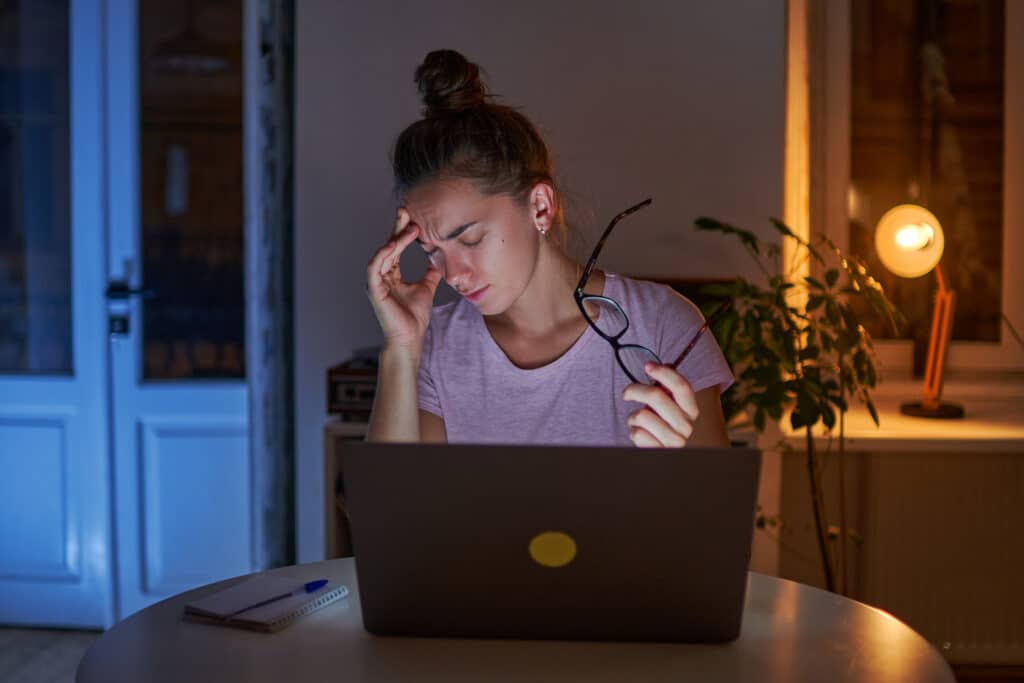
Experiencing high-stress levels can cause physical problems in our bodies and mental health issues as well. Eye problems and diseases can develop if you put your body and eyes under too much stress. Working long hours, neglecting proper eye care, or looking at harmful lights can impact your vision for the rest of your life. Below are some common eye problems that can occur because of the intricate connection between high anxiety and our eye health.
Dry Eyes
For those who experience chronic stress, your body’s ability to maintain healthy tear film can be affected. Tears and moisture are crucial for your eyes to stay comfortable and allow you to see clearly. Stress disrupts the delicate balance your body has created which can lead to a gritty, burning, or irritated sensation. Prolonged distress can lead to inflammation, worsening the symptoms of dry eyes. Drink plenty of water, get plenty of sleep, or use eye drops when necessary to help improve dry eyes.
Migraines
A major trigger for migraines is stress. Severe headaches can often involve eye pain and sensitivity to light. When you experience a migraine, it can be debilitating and affect your quality of life. Your eyes can be a contributing factor to headaches, especially when stress is involved. Eye irritation and stress can exacerbate to make headaches more frequent and intense.
Glaucoma
A direct link between overwhelm and glaucoma has not been found, but stress can cause people to forget their medications, put in eye drops, or do basic tasks like drinking water. One study found that stress can limit our blood circulation which is a main cause for inflammation. Stress can also elevate intraocular pressure, which is a significant risk factor for glaucoma. While stress may not directly cause foggy vision, it can seem to contribute to it by lowering our body’s ability to fight off infection and inflammation.
Visual Disturbances

Instances of tunnel vision, light sensitivity, and temporary vision loss have all been linked to extremely high levels of overwhelm or worry in the past. People often experience these symptoms when they have anxiety or panic attacks that are caused by stress. Not all of these vision disturbances are permanent, but if worry or panic is not controlled, it could have longer-lasting effects on your vision.
Digital Eye Strain
As more people spend time around technology, the strain on our eyes increases. Blue light can cause damage to your eyes and looking at a bright screen in the dark can cause eye strain. Especially if you use a computer at work where you experience high stress, you could be at higher risk for eye strain or other vision problems.
Eye fatigue can lead to headaches or blurred vision, which can make it hard to stay calm. Limiting your overall stress and knowing when it is time to take a break from the screen is crucial for your eye health. You may also benefit from blue light glasses or other prescription lenses to help reduce the effect a computer screen can have on your eyes.
Ways To Limit Stress And Reduce The Likelihood Of Eye Problems
It is often easier said than done to limit stress in your life. Lowering your stress levels, getting treated for anxiety, or practicing meditation are all ways that you can improve symptoms leading to eye problems.
Improve Your Sleep Habits
One way to keep up with your eye health is to get adequate sleep. When people are stressed, they often have a hard time going to sleep or staying asleep. Not only does this deprive your body of the rest it needs to heal, but many people use TV or scrolling on their phones to help them fall asleep. This can further strain your eyes and contribute to higher stress levels. Try to stop using devices an hour before bedtime to help your body relax and limit eye strain.
Mindfulness And Meditation
Another way to help improve your mindset is to practice meditation. Meditation will not improve your eyes directly, but it can help refocus the mind and reduce anxiety. Muscle relaxation techniques, yoga, and mindfulness can all help reduce symptoms leading to eye problems.

Seek Professional Help
If you are not able to reduce stress on your own or your eye problems persist, consider working with professionals. Opticians may be able to help prescribe eye drops or medications to reduce inflammation. Therapists or primary doctors can help with stress-reducing coping mechanisms or anxiety medication. No matter what solution you seek, getting help from others can drastically improve your overall health.
